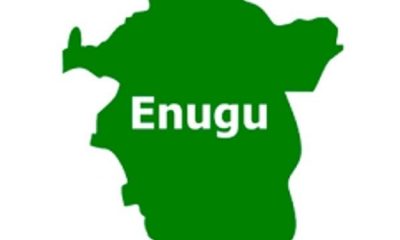metro
Sit-at-home order: Gov Mbah seals 106 shops, 2 banks in Enugu

The Enugu State Government on Monday sealed 106 shops and two banks for allegedly observing Monday’s sit-at-home order by a faction of the proscribed Indigenous People of Biafra.
The News Agency of Nigeria (NAN) reports the exercise was carried out by officials of the State Government and Enugu Capital Territory Development Authority (ECTDA).
NAN recalls that Gov. Peter Mbah had last Monday threatened to sanction shop owners and banks that refused to open for business in complience with the illegal sit-at-home order.
Mbah issued the threat, while monitoring the situation in major markets in Enugu, the capital city.
According to him, traders who continued to obey the order up until July 24, stood to lose their shops to serious-minded businessmen.
The Secretary to the State Government (SSG), Prof. Chidiebere Onyia, who led the exercise, said the action was in line with the governor’s warning.
Onyia said the governor’s intention was not to punish businesses but encourage and inculcate the spirit of ‘no sit-at-home’ in traders.
READ ALSO:
- Subsidy: Like Kwara, Ogun govt approves N10,000 palliatives for workers, pensioners
- Sudan: 435 children killed, 2,000 injured in 100 days – UNICEF
- Police arrest 2 suspects as Atiku escapes death, PDP demands investigation
“It is not a punitive but ownership culture, where all of us come together to fight the menace of illegal sit-at-home in the state.
“We are taking it up not because Mbah is in the business of stopping economic growth but to fight those that think they can intimidate us,” he said.
Onyia further said that the task force created by the State Government would be in the markets next Monday to continue to monitor the situation.
“We have been to ShopRite, Celebrity – a shopping mall – SPAR and others, we saw shops that were not opened and we sealed them.
“That is why ECTDA is here and the owners should go through a process to get them reopened,” he said.
He said that 85 per cent of traders showed up in the markets visited.
The SSG said that the governor had made a commitment by providing security and buses at specific places to convey workers to the state Secretariat.
He said the measure became necessary because the state was tired of losing significant revenue by working for only four days a week.
On why he unsealed Easter Shop earlier, Onyia said the management of the mall gave an assurance to open every Monday.
Speaking with newsmen at the end of the exercise, the Head of ECTDA, Mr Gideon Onyia, said that the affected shops were both corporate and privately owned.
READ ALSO:
- Chinese coach apologises for slapping referee
- 8 escape death as two-storey building collapses in Oyo
- Cultists kill police inspector in Lagos
- Enugu councillor sent to prison for allegedly stealing IDP fund
He said that 78 shops were sealed at the Ogbete Market, plus two new generation banks, five shops at SPAR and 24 shops at the Old Artisan Market.
“So if you failed to obey our rules and directives, we can revoke them or withdraw your approvals and give them to people who are eager to do business in the state.
“Those whose shops are sealed, we will tell them the penalty but the governor was magnanimous for saying that the exercise was not punitive,” Onyia said.
Meanwhile, some of the traders, who spoke to NAN, said they open for business on Mondays but record low sales due to the absence of customers.
A trader, who identified himself simply as Nnamdi, said he usually wasted his transport fares to and fro his shop on Mondays without making any sales.
Also, Mrs Ngozi Oji, attributed the traders absence from the markets to fear of being attacked by gunmen.
Oji, therefore, urged the government to provide adequate security in and around the market to allay the traders’ fear. (NAN)
metro
Explosion in Yobe, three people hospitalised

Explosion in Yobe, three people hospitalised
At least 3 persons have been hospitalised after an undetonated Improvised Explosive Device exploded in Gujba Local Government Area of Yobe State.
The explosion took place on Saturday at Ngomari Community in Buni Yadi, headquarters of Gujba Local Government Area.
A reliable source in the area told Daily Trust that the incident happened when a 22-year-old discovered live ammunition and four AK47 rounds while fetching firewood in the bush.
“The young man attempted to open the ammunition out of curiosity.
READ ALSO:
- Rivers: Presidency reveals security intelligence leading to emergency rule
- Shehu Sani faults senators taking voice vote objection to media
- Abducted Anambra Rev Fr released after police, gunmen fierce battle
“He proceeded to strike the ammunition with a hammer, which triggered an explosion. 3 persons including the young man sustained various degrees of injury,” the source said.
Confirming the incident, the Secretary of the Local Metal Fabricators Association, Gujba LG, Malam Isyaku Dahiru, said the victims were moved to Yobe State Specialist Hospital Buni Yadi for urgent treatment.
Efforts to get the reaction of the Public Relations Officer of the Yobe State Police Command, SP Dungus Abdulkarim, were not successful as he did not pick his calls and was yet to reply to the calls as at the time of filing this report.
Boko Haram terrorists have been using IEDs to launch attacks on communities in the area.
Explosion in Yobe, three people hospitalised
metro
Rivers: Presidency reveals security intelligence leading to emergency rule

Rivers: Presidency reveals security intelligence leading to emergency rule
The Presidency has revealed that security intelligence reports led to the suspension of Rivers State Governor Siminalayi Fubara, his deputy, and elected members of the State House of Assembly.
According to the government, militants were already targeting oil pipelines, posing a serious threat to national security and the economy.
Bayo Onanuga, Special Adviser to President Bola Tinubu on Information and Strategy, disclosed this in an article titled “Imagine Rivers State Without a State of Emergency”, published on Sunday.
He maintained that intelligence reports showed an escalating crisis in the oil-rich state.
President Tinubu, in a nationwide broadcast on Tuesday, explained that his efforts to mediate the political conflict in Rivers had been ignored. He stated that worsening security threats necessitated the declaration of a state of emergency.
“The latest security reports made available to me show that between yesterday and today, there have been disturbing incidents of vandalization of pipelines by some militants, without the governor taking any action to curtail them. I have, of course, given stern orders to the security agencies to ensure the safety of the good people of Rivers State and the oil pipelines,” Tinubu said while announcing the emergency rule.
READ ALSO:
- Shehu Sani faults senators taking voice vote objection to media
- Abducted Anambra Rev Fr released after police, gunmen fierce battle
- Group tackles Natasha over call for drug test on senators
The decision has drawn criticism from various quarters, with many questioning its necessity. However, the Presidency has defended the move, insisting it was based on credible security intelligence.
Onanuga explained that Section 305 of the Constitution empowers the President to act when there is a threat to law, order, or economic security.
“Impeachment threats might have spurred attacks on lawmakers by the governor’s supporters, while militants in the creeks—primed to sabotage critical oil infrastructure—could have plunged Nigeria’s oil production back to pre-2023 lows,” he stated.
He further alleged that militants were awaiting instructions from Fubara before launching attacks on pipelines.
“Intelligence confirmed that militants, told by Fubara to await signals, were already targeting pipelines, risking a collapse in output and a Niger-Delta domino effect,” Onanuga added.
According to him, Tinubu’s intervention was crucial, as Rivers State is a key player in Nigeria’s oil sector. He warned that any disruption in the region could have dire economic consequences.
He dismissed claims that the emergency rule undermines democracy, arguing that it is a “temporary, surgical” measure aimed at restoring order rather than replacing democratic institutions.
Rivers: Presidency reveals security intelligence leading to emergency rule
metro
Shehu Sani faults senators taking voice vote objection to media

Shehu Sani faults senators taking voice vote objection to media
A former senator who represented Kaduna Central Senatorial District has slammed lawmakers for going to the media to raise objections against the adoption of voice voting for the confirmation of a State of Emergency in Rivers State.
Shehu Sani said that any lawmaker who wished to raise such an objection ought to have done so in the chambers of the National Assembly and not the media.
Recall that members of the National Assembly had voted on the proclamation of a State of Emergency in Rivers by President Bola Tinubu.
However, rather than adhere to the provisions of the law by taking a head count to determine that the Assembly had formed a quorum, the leadership of both chambers adopted voice voting.
READ ALSO:
- Abducted Anambra Rev Fr released after police, gunmen fierce battle
- Group tackles Natasha over call for drug test on senators
- Taraba police spokesman Abdullahi Usman is dead
Shortly after the voting process which was condemned by many including Peter Obi, Atiku Abubakar, and the Peoples Democratic Party among others, Ireti Kingibe, a serving lawmaker condemned the process.
In his reaction, to this Sani said all objections should be done within the chambers, not outside or in the media.
He wrote on X, “If any lawmaker had issues with voice votes or quorum, he or she is supposed to raise a point of order on the floor and insist on being heard; and not be silent in the chamber then come to the media to raise objections.
“If there is no quorum, it’s because some lawmakers deliberately chose to abstain,” Sani noted.
Shehu Sani faults senators taking voice vote objection to media
-

 metro3 days ago
metro3 days agoNatasha: Court blocks recall attempt, stops INEC
-

 Sports3 days ago
Sports3 days agoOdegbami speaks on Osimhen breaking his 44-year goals record
-

 Entertainment3 days ago
Entertainment3 days agoI didn’t snatch Asake’s mother from her husband -Musibau Alani
-

 Entertainment1 day ago
Entertainment1 day agoSome ladies in movie industry ready to sleep their way to fame — Jide Kosoko
-

 metro19 hours ago
metro19 hours agoCourt refers Ojukwu property case to alternative dispute resolution
-

 metro3 days ago
metro3 days agoOluwo accuses Ooni of plotting to dethrone him
-

 metro1 day ago
metro1 day agoPresidency blasts Jonathan, Soyinka over comments on emergency rule in Rivers
-

 metro3 days ago
metro3 days agoBoko Haram attacks military base in Adamawa













